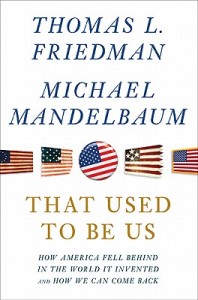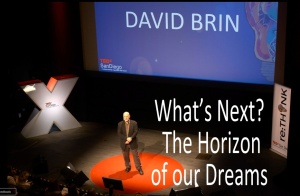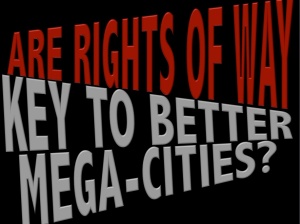First some pertinent announcements!
March 1 is Future Day …even though it should have been March Forth (into the future!)
The initial episode of NASA’s Unexplained Files airs on Sunday 2nd March at 10 pm on the Science Channel. I was interviewed as one of the talking heads… though how you're edited always depends upon the style of the show. Here's hoping they went for (at least some) serious science! Episode 2 is on Thursday 6th March, Episode 3 Tuesday 11th March and Episode 4 is on Tuesday 18th March.
The embryonic Science Fiction Museum in Washington DC is closing its crowdfund activity on March 9th – if you haven’t already done so, look it over and consider making a contribution before it ends: www.scificrowdfund.com - all contributors will appear on the website as “Founding Colonists.”
And now… back to the crucial issue of our time.
==Sousveillance battles Surveillance==
 In this transparency posting, let's start with a solid book: In Dragnet Nation: A Quest for Privacy, Security and Freedom in a World of Relentless Surveillance, Julia Angwin reports from the front lines of America’s surveillance economy, offering a revelatory and unsettling look at how the government, private companies, and even criminals use technology to indiscriminately sweep up vast amounts of our personal data.
In this transparency posting, let's start with a solid book: In Dragnet Nation: A Quest for Privacy, Security and Freedom in a World of Relentless Surveillance, Julia Angwin reports from the front lines of America’s surveillance economy, offering a revelatory and unsettling look at how the government, private companies, and even criminals use technology to indiscriminately sweep up vast amounts of our personal data.
In a world where we can be watched in our own homes, where we can no longer keep secrets, and where we can be impersonated, financially manipulated, or even placed in a police lineup, Angwin argues that the greatest long-term danger is that we start to internalize the surveillance and censor our words and thoughts, until we lose the very freedom that makes us unique individuals. Appalled at such a prospect, Angwin conducts a series of experiments to try to protect herself.
More than that, Angwin struggles between the twin impulses -- trying to hide from surveillance and ultimately neutralizing its power to do harm by looking back. In the end -- especially the last two paragraphs of her interesting book, she makes (what I consider to be) the definitively wise choice.
Listen to Angwin's interview on NPR.
Listen to Angwin's interview on NPR.
== Light battles its way in ==
US prosecutors are chasing 14 Swiss banks for allegedly helping wealthy Americans dodge U.S. taxes. Credit Suisse's private banking and wealth management division has already put aside 175m Swiss francs (£118m) to fight a U.S. investigation into hidden offshore accounts in Switzerland. The bank has said it was "working towards a resolution" with US authorities but has not given a time-frame of when that resolution might be reached.
My prediction? A deal will be struck. Swiss and other secret banking havens know the era when they can thumb noses at Europe and the U.S. are passing. Besides, helping western mere-millionaires writhe out of taxes is not where the real action is. The big profits come from sheltering and protecting the seamier side of sovereign wealth funds and stashing loot stolen from developing nations by local kleptocrats.
Those business lines will be protected at all costs. Even if it means tossing a few hundred mere-millionaires off the sleigh.
 Will your light switch turn on you? Philips, one of the biggest names in lighting (and especially in the new world of low-cost LED lighting), has figured out a way to use light as a communications method. The wonderful LED bulbs we're all installing (this is the year; do it!) can't be used this way...
Will your light switch turn on you? Philips, one of the biggest names in lighting (and especially in the new world of low-cost LED lighting), has figured out a way to use light as a communications method. The wonderful LED bulbs we're all installing (this is the year; do it!) can't be used this way...
...but a future generation of them can and will someday be controlled as emitters whose subtle variations can contain signals we won't notice as the bulbs talk to each other… and to computers far away. The advantages and uses will be myriad! And any room will be whispering data about us.
Want to stop that? Good luck. When will folks cease futile railing against the future and start admitting it is a tsunami. What we need is not absurdly useless stop signs and whining. What we need are surfboards.
Wearable computing pioneer and University of Toronto professor Steve Mann has offered the following poly-lingual riffs on the core idea that he and I both promote:
French:
Surveillance Sousveillance
Surveillance Sousveillance
English:
Oversight Undersight
Oversight Undersight
Latin:
Supervision Subvision
Elaine Scarry tackles these issues in Transparent Citizens, Invisible Government, in the Boston Review.
Meanwhile…India enters the sousveillance age. And Turkey steps closer to a surveillance state.
 Where will the next crisis come from? Here's an interesting article from investor Jeremy Grantham concerning Tesla motors, peak oil production and peak oil demand, the mining industry and phosphorus, and fracking's possible role in increased earthquakes. Well worth reading, especially for the many overlaps with my predictions in Existence, coming true much faster than I expected...
Where will the next crisis come from? Here's an interesting article from investor Jeremy Grantham concerning Tesla motors, peak oil production and peak oil demand, the mining industry and phosphorus, and fracking's possible role in increased earthquakes. Well worth reading, especially for the many overlaps with my predictions in Existence, coming true much faster than I expected...
Again, privacy activists are up in arms over license plate scanners… proving that you can be right to be concerned about the possible looming of a Big Brother State… while being stunningly dense and stupid about what's practical and what might actually help to prevent Orwellianism Those who believe that they can stymie such a system are probably right… for a year or two… till optical recognition becomes so ubiquitous that there is no "system" at all… when every person will have access to billions of cameras, all over, getting smaller/cheaper and more numerous each month.
Seriously. You think trying to rail and whine about increasing vision will stop it? Try stopping the tide. Earth's orbit. Or time.
There is, on the other hand, a different way to stay free. Read the wiser people out there. Dragnet Nation could be a good start.
There is, on the other hand, a different way to stay free. Read the wiser people out there. Dragnet Nation could be a good start.
































